The Sackler Family Business: Unethical Practices and Consequences
VerifiedAdded on 2023/01/19
|10
|2737
|66
AI Summary
This report analyzes the unethical practices of Purdue Pharma, run by the Sackler Family, and the consequences it faced. It explores the success of the company in terms of revenue, shareholders, board, and public confidence. The report also suggests reinforcements, training, and monitoring as ways for Purdue Pharma to protect itself from future unethical conduct.
Contribute Materials
Your contribution can guide someone’s learning journey. Share your
documents today.
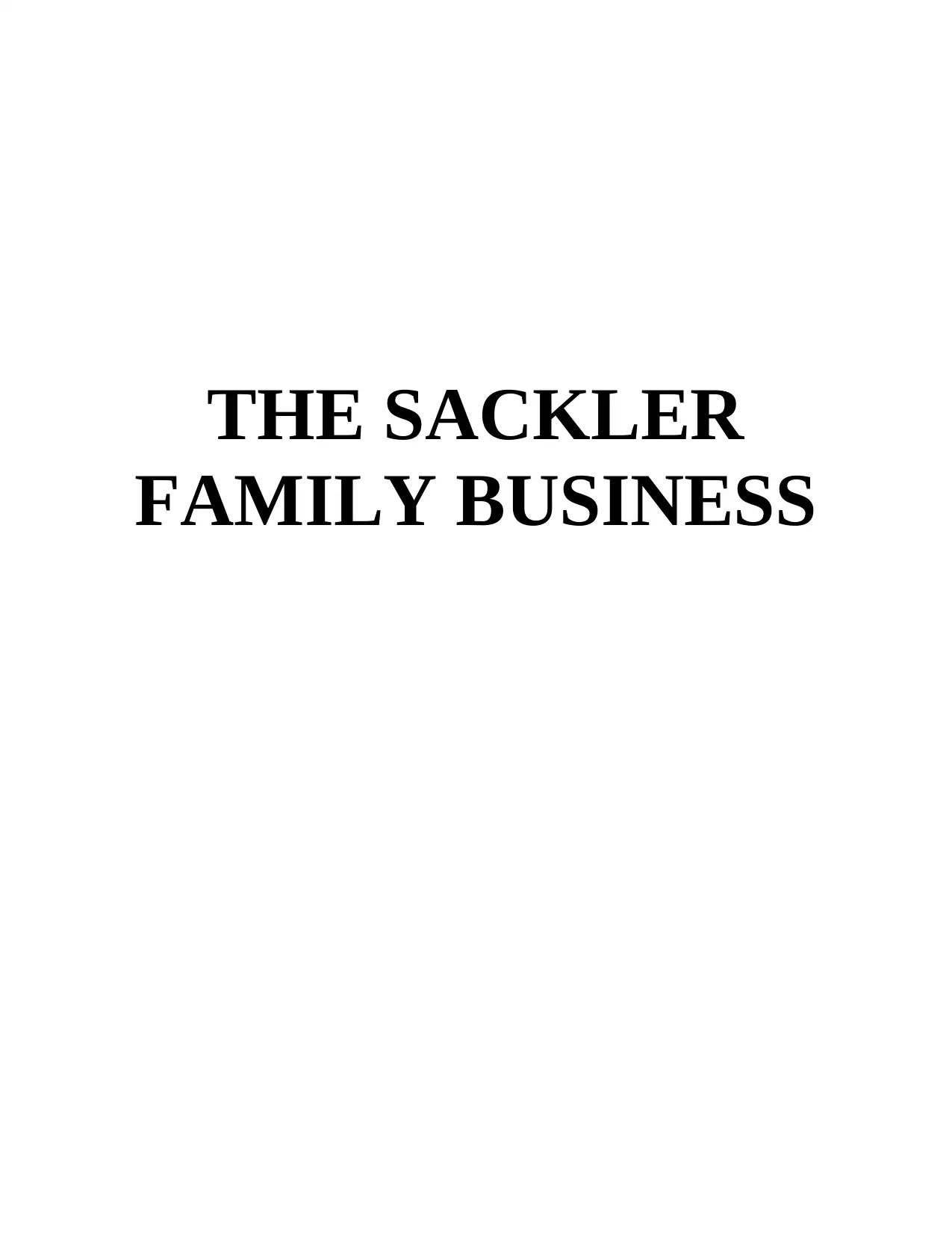
THE SACKLER
FAMILY BUSINESS
FAMILY BUSINESS
Secure Best Marks with AI Grader
Need help grading? Try our AI Grader for instant feedback on your assignments.
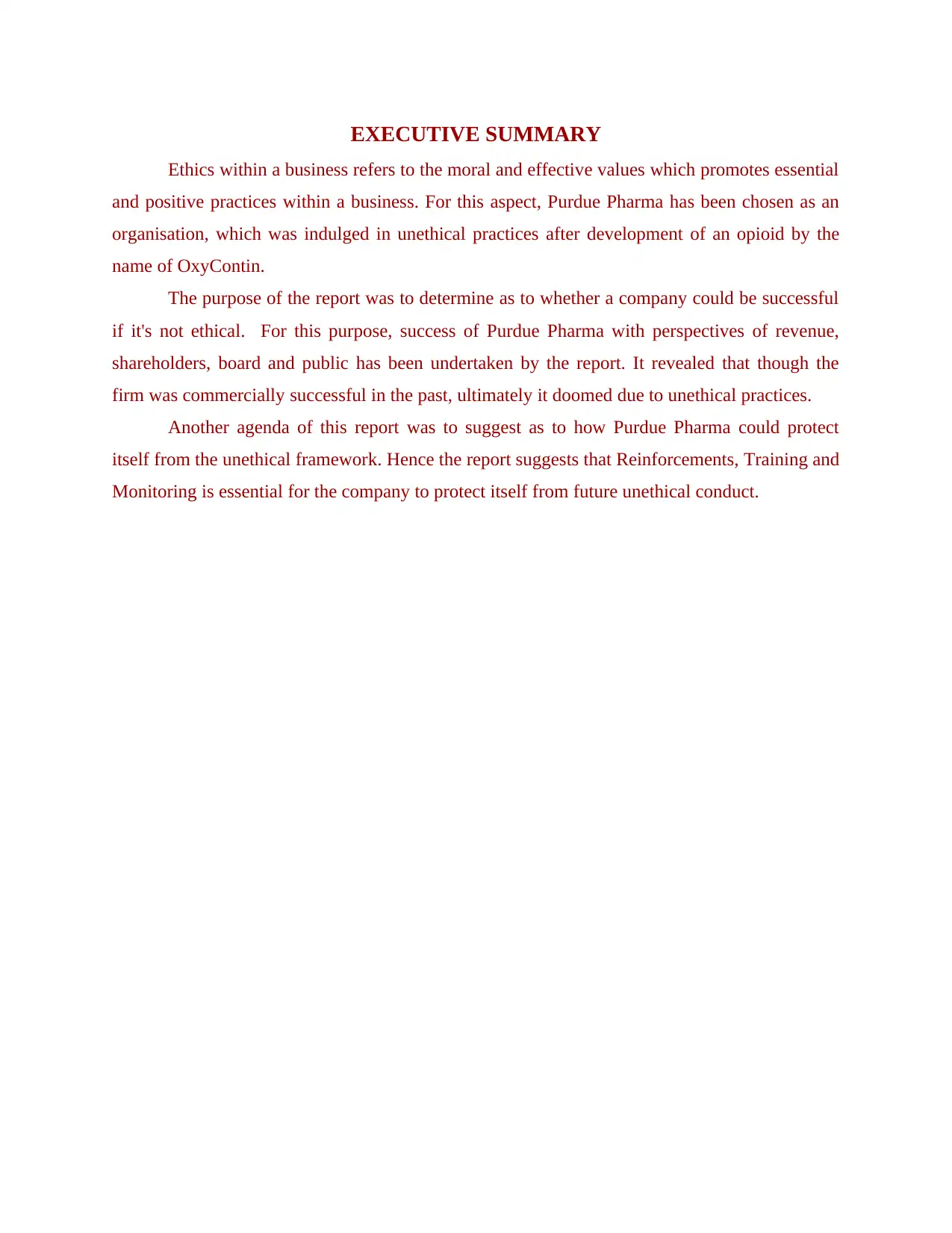
EXECUTIVE SUMMARY
Ethics within a business refers to the moral and effective values which promotes essential
and positive practices within a business. For this aspect, Purdue Pharma has been chosen as an
organisation, which was indulged in unethical practices after development of an opioid by the
name of OxyContin.
The purpose of the report was to determine as to whether a company could be successful
if it's not ethical. For this purpose, success of Purdue Pharma with perspectives of revenue,
shareholders, board and public has been undertaken by the report. It revealed that though the
firm was commercially successful in the past, ultimately it doomed due to unethical practices.
Another agenda of this report was to suggest as to how Purdue Pharma could protect
itself from the unethical framework. Hence the report suggests that Reinforcements, Training and
Monitoring is essential for the company to protect itself from future unethical conduct.
Ethics within a business refers to the moral and effective values which promotes essential
and positive practices within a business. For this aspect, Purdue Pharma has been chosen as an
organisation, which was indulged in unethical practices after development of an opioid by the
name of OxyContin.
The purpose of the report was to determine as to whether a company could be successful
if it's not ethical. For this purpose, success of Purdue Pharma with perspectives of revenue,
shareholders, board and public has been undertaken by the report. It revealed that though the
firm was commercially successful in the past, ultimately it doomed due to unethical practices.
Another agenda of this report was to suggest as to how Purdue Pharma could protect
itself from the unethical framework. Hence the report suggests that Reinforcements, Training and
Monitoring is essential for the company to protect itself from future unethical conduct.
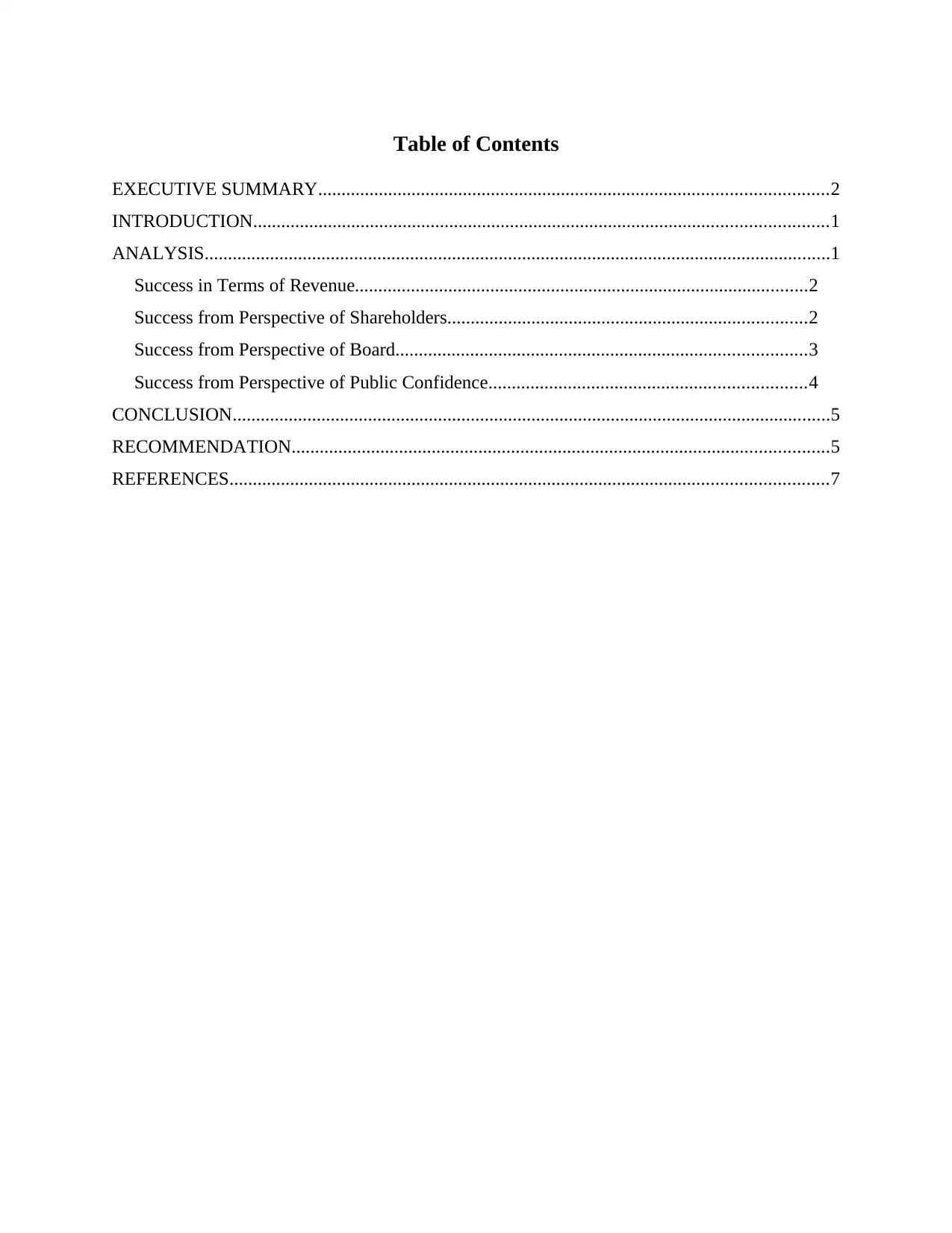
Table of Contents
EXECUTIVE SUMMARY.............................................................................................................2
INTRODUCTION...........................................................................................................................1
ANALYSIS......................................................................................................................................1
Success in Terms of Revenue.................................................................................................2
Success from Perspective of Shareholders.............................................................................2
Success from Perspective of Board........................................................................................3
Success from Perspective of Public Confidence....................................................................4
CONCLUSION................................................................................................................................5
RECOMMENDATION...................................................................................................................5
REFERENCES................................................................................................................................7
EXECUTIVE SUMMARY.............................................................................................................2
INTRODUCTION...........................................................................................................................1
ANALYSIS......................................................................................................................................1
Success in Terms of Revenue.................................................................................................2
Success from Perspective of Shareholders.............................................................................2
Success from Perspective of Board........................................................................................3
Success from Perspective of Public Confidence....................................................................4
CONCLUSION................................................................................................................................5
RECOMMENDATION...................................................................................................................5
REFERENCES................................................................................................................................7
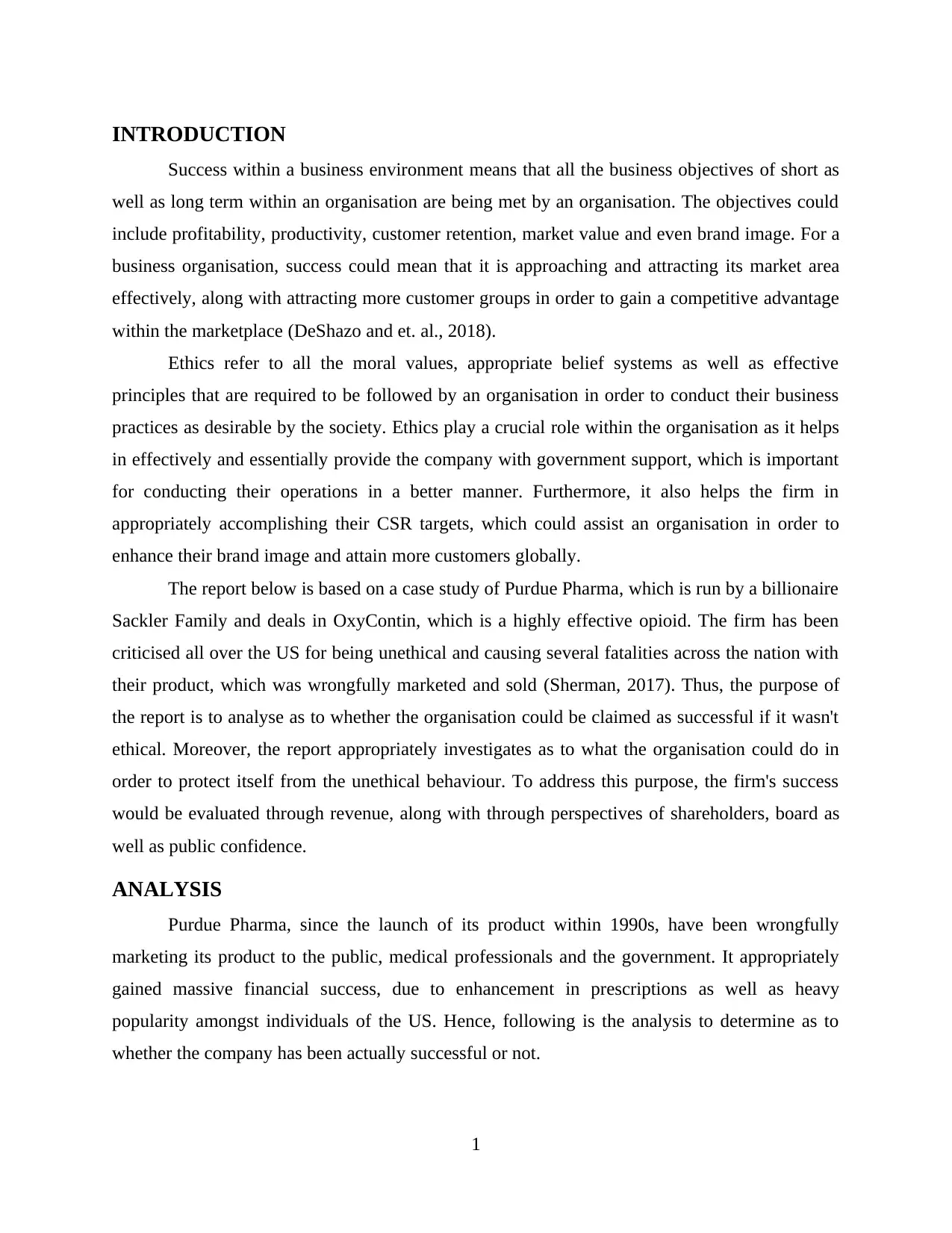
INTRODUCTION
Success within a business environment means that all the business objectives of short as
well as long term within an organisation are being met by an organisation. The objectives could
include profitability, productivity, customer retention, market value and even brand image. For a
business organisation, success could mean that it is approaching and attracting its market area
effectively, along with attracting more customer groups in order to gain a competitive advantage
within the marketplace (DeShazo and et. al., 2018).
Ethics refer to all the moral values, appropriate belief systems as well as effective
principles that are required to be followed by an organisation in order to conduct their business
practices as desirable by the society. Ethics play a crucial role within the organisation as it helps
in effectively and essentially provide the company with government support, which is important
for conducting their operations in a better manner. Furthermore, it also helps the firm in
appropriately accomplishing their CSR targets, which could assist an organisation in order to
enhance their brand image and attain more customers globally.
The report below is based on a case study of Purdue Pharma, which is run by a billionaire
Sackler Family and deals in OxyContin, which is a highly effective opioid. The firm has been
criticised all over the US for being unethical and causing several fatalities across the nation with
their product, which was wrongfully marketed and sold (Sherman, 2017). Thus, the purpose of
the report is to analyse as to whether the organisation could be claimed as successful if it wasn't
ethical. Moreover, the report appropriately investigates as to what the organisation could do in
order to protect itself from the unethical behaviour. To address this purpose, the firm's success
would be evaluated through revenue, along with through perspectives of shareholders, board as
well as public confidence.
ANALYSIS
Purdue Pharma, since the launch of its product within 1990s, have been wrongfully
marketing its product to the public, medical professionals and the government. It appropriately
gained massive financial success, due to enhancement in prescriptions as well as heavy
popularity amongst individuals of the US. Hence, following is the analysis to determine as to
whether the company has been actually successful or not.
1
Success within a business environment means that all the business objectives of short as
well as long term within an organisation are being met by an organisation. The objectives could
include profitability, productivity, customer retention, market value and even brand image. For a
business organisation, success could mean that it is approaching and attracting its market area
effectively, along with attracting more customer groups in order to gain a competitive advantage
within the marketplace (DeShazo and et. al., 2018).
Ethics refer to all the moral values, appropriate belief systems as well as effective
principles that are required to be followed by an organisation in order to conduct their business
practices as desirable by the society. Ethics play a crucial role within the organisation as it helps
in effectively and essentially provide the company with government support, which is important
for conducting their operations in a better manner. Furthermore, it also helps the firm in
appropriately accomplishing their CSR targets, which could assist an organisation in order to
enhance their brand image and attain more customers globally.
The report below is based on a case study of Purdue Pharma, which is run by a billionaire
Sackler Family and deals in OxyContin, which is a highly effective opioid. The firm has been
criticised all over the US for being unethical and causing several fatalities across the nation with
their product, which was wrongfully marketed and sold (Sherman, 2017). Thus, the purpose of
the report is to analyse as to whether the organisation could be claimed as successful if it wasn't
ethical. Moreover, the report appropriately investigates as to what the organisation could do in
order to protect itself from the unethical behaviour. To address this purpose, the firm's success
would be evaluated through revenue, along with through perspectives of shareholders, board as
well as public confidence.
ANALYSIS
Purdue Pharma, since the launch of its product within 1990s, have been wrongfully
marketing its product to the public, medical professionals and the government. It appropriately
gained massive financial success, due to enhancement in prescriptions as well as heavy
popularity amongst individuals of the US. Hence, following is the analysis to determine as to
whether the company has been actually successful or not.
1
Secure Best Marks with AI Grader
Need help grading? Try our AI Grader for instant feedback on your assignments.
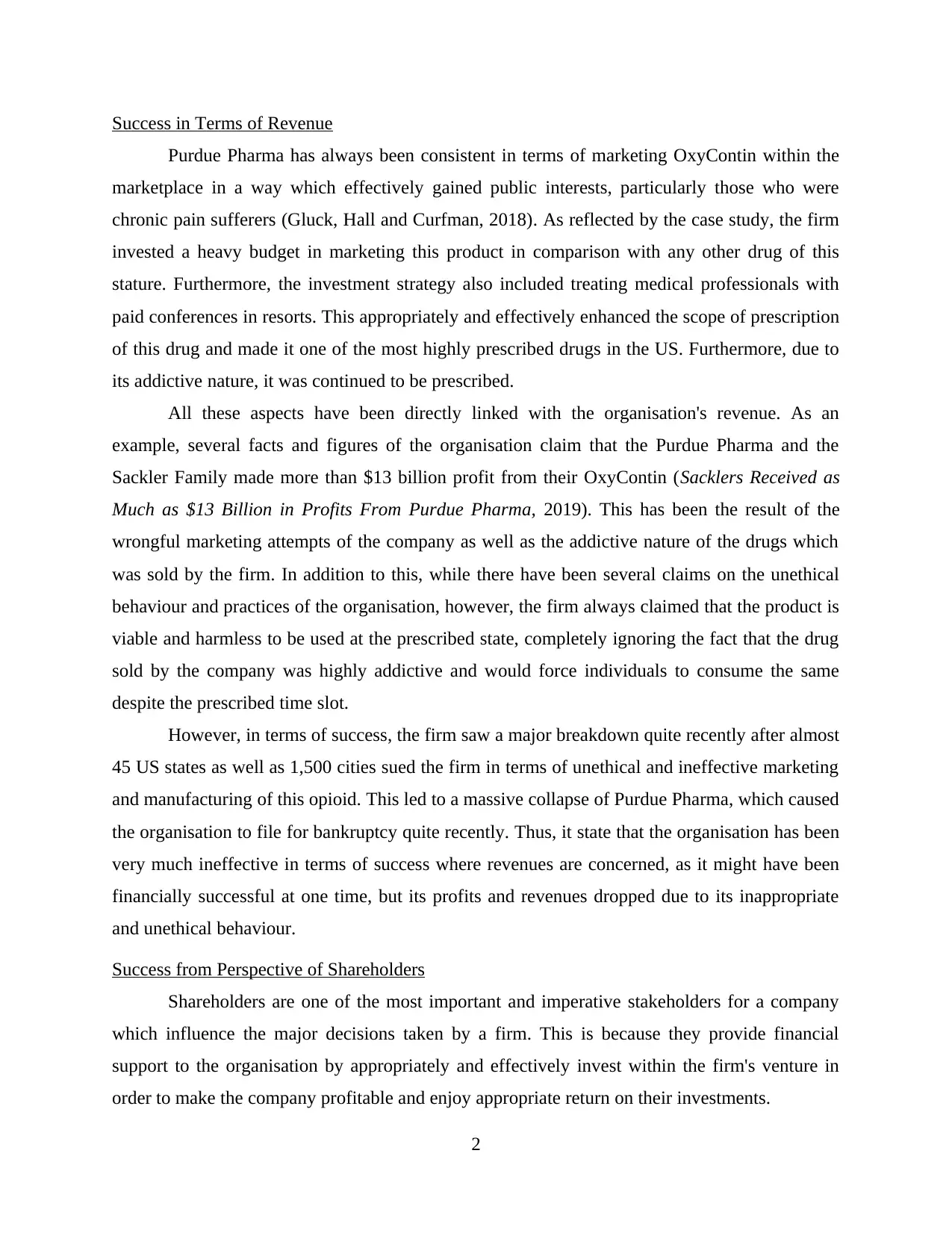
Success in Terms of Revenue
Purdue Pharma has always been consistent in terms of marketing OxyContin within the
marketplace in a way which effectively gained public interests, particularly those who were
chronic pain sufferers (Gluck, Hall and Curfman, 2018). As reflected by the case study, the firm
invested a heavy budget in marketing this product in comparison with any other drug of this
stature. Furthermore, the investment strategy also included treating medical professionals with
paid conferences in resorts. This appropriately and effectively enhanced the scope of prescription
of this drug and made it one of the most highly prescribed drugs in the US. Furthermore, due to
its addictive nature, it was continued to be prescribed.
All these aspects have been directly linked with the organisation's revenue. As an
example, several facts and figures of the organisation claim that the Purdue Pharma and the
Sackler Family made more than $13 billion profit from their OxyContin (Sacklers Received as
Much as $13 Billion in Profits From Purdue Pharma, 2019). This has been the result of the
wrongful marketing attempts of the company as well as the addictive nature of the drugs which
was sold by the firm. In addition to this, while there have been several claims on the unethical
behaviour and practices of the organisation, however, the firm always claimed that the product is
viable and harmless to be used at the prescribed state, completely ignoring the fact that the drug
sold by the company was highly addictive and would force individuals to consume the same
despite the prescribed time slot.
However, in terms of success, the firm saw a major breakdown quite recently after almost
45 US states as well as 1,500 cities sued the firm in terms of unethical and ineffective marketing
and manufacturing of this opioid. This led to a massive collapse of Purdue Pharma, which caused
the organisation to file for bankruptcy quite recently. Thus, it state that the organisation has been
very much ineffective in terms of success where revenues are concerned, as it might have been
financially successful at one time, but its profits and revenues dropped due to its inappropriate
and unethical behaviour.
Success from Perspective of Shareholders
Shareholders are one of the most important and imperative stakeholders for a company
which influence the major decisions taken by a firm. This is because they provide financial
support to the organisation by appropriately and effectively invest within the firm's venture in
order to make the company profitable and enjoy appropriate return on their investments.
2
Purdue Pharma has always been consistent in terms of marketing OxyContin within the
marketplace in a way which effectively gained public interests, particularly those who were
chronic pain sufferers (Gluck, Hall and Curfman, 2018). As reflected by the case study, the firm
invested a heavy budget in marketing this product in comparison with any other drug of this
stature. Furthermore, the investment strategy also included treating medical professionals with
paid conferences in resorts. This appropriately and effectively enhanced the scope of prescription
of this drug and made it one of the most highly prescribed drugs in the US. Furthermore, due to
its addictive nature, it was continued to be prescribed.
All these aspects have been directly linked with the organisation's revenue. As an
example, several facts and figures of the organisation claim that the Purdue Pharma and the
Sackler Family made more than $13 billion profit from their OxyContin (Sacklers Received as
Much as $13 Billion in Profits From Purdue Pharma, 2019). This has been the result of the
wrongful marketing attempts of the company as well as the addictive nature of the drugs which
was sold by the firm. In addition to this, while there have been several claims on the unethical
behaviour and practices of the organisation, however, the firm always claimed that the product is
viable and harmless to be used at the prescribed state, completely ignoring the fact that the drug
sold by the company was highly addictive and would force individuals to consume the same
despite the prescribed time slot.
However, in terms of success, the firm saw a major breakdown quite recently after almost
45 US states as well as 1,500 cities sued the firm in terms of unethical and ineffective marketing
and manufacturing of this opioid. This led to a massive collapse of Purdue Pharma, which caused
the organisation to file for bankruptcy quite recently. Thus, it state that the organisation has been
very much ineffective in terms of success where revenues are concerned, as it might have been
financially successful at one time, but its profits and revenues dropped due to its inappropriate
and unethical behaviour.
Success from Perspective of Shareholders
Shareholders are one of the most important and imperative stakeholders for a company
which influence the major decisions taken by a firm. This is because they provide financial
support to the organisation by appropriately and effectively invest within the firm's venture in
order to make the company profitable and enjoy appropriate return on their investments.
2
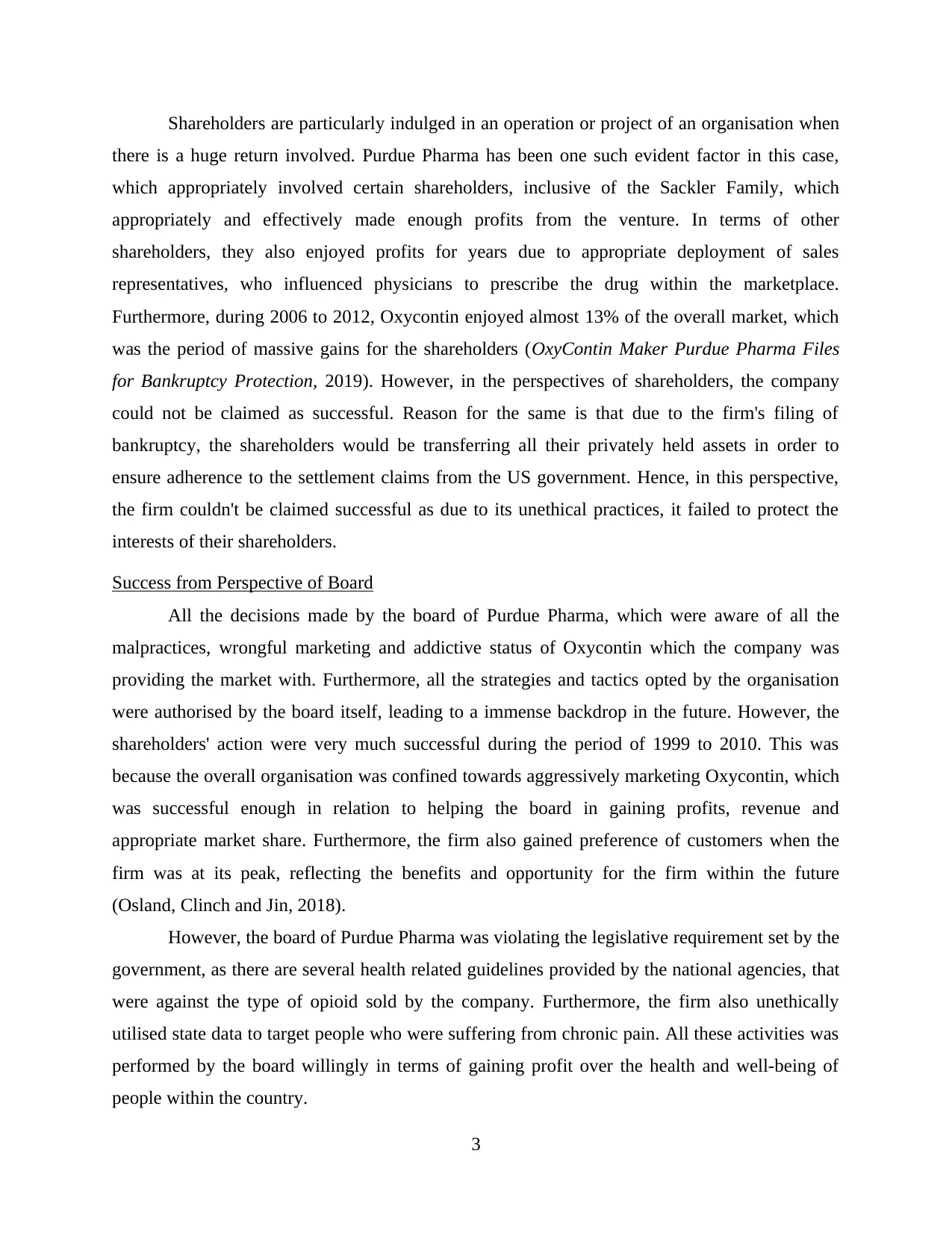
Shareholders are particularly indulged in an operation or project of an organisation when
there is a huge return involved. Purdue Pharma has been one such evident factor in this case,
which appropriately involved certain shareholders, inclusive of the Sackler Family, which
appropriately and effectively made enough profits from the venture. In terms of other
shareholders, they also enjoyed profits for years due to appropriate deployment of sales
representatives, who influenced physicians to prescribe the drug within the marketplace.
Furthermore, during 2006 to 2012, Oxycontin enjoyed almost 13% of the overall market, which
was the period of massive gains for the shareholders (OxyContin Maker Purdue Pharma Files
for Bankruptcy Protection, 2019). However, in the perspectives of shareholders, the company
could not be claimed as successful. Reason for the same is that due to the firm's filing of
bankruptcy, the shareholders would be transferring all their privately held assets in order to
ensure adherence to the settlement claims from the US government. Hence, in this perspective,
the firm couldn't be claimed successful as due to its unethical practices, it failed to protect the
interests of their shareholders.
Success from Perspective of Board
All the decisions made by the board of Purdue Pharma, which were aware of all the
malpractices, wrongful marketing and addictive status of Oxycontin which the company was
providing the market with. Furthermore, all the strategies and tactics opted by the organisation
were authorised by the board itself, leading to a immense backdrop in the future. However, the
shareholders' action were very much successful during the period of 1999 to 2010. This was
because the overall organisation was confined towards aggressively marketing Oxycontin, which
was successful enough in relation to helping the board in gaining profits, revenue and
appropriate market share. Furthermore, the firm also gained preference of customers when the
firm was at its peak, reflecting the benefits and opportunity for the firm within the future
(Osland, Clinch and Jin, 2018).
However, the board of Purdue Pharma was violating the legislative requirement set by the
government, as there are several health related guidelines provided by the national agencies, that
were against the type of opioid sold by the company. Furthermore, the firm also unethically
utilised state data to target people who were suffering from chronic pain. All these activities was
performed by the board willingly in terms of gaining profit over the health and well-being of
people within the country.
3
there is a huge return involved. Purdue Pharma has been one such evident factor in this case,
which appropriately involved certain shareholders, inclusive of the Sackler Family, which
appropriately and effectively made enough profits from the venture. In terms of other
shareholders, they also enjoyed profits for years due to appropriate deployment of sales
representatives, who influenced physicians to prescribe the drug within the marketplace.
Furthermore, during 2006 to 2012, Oxycontin enjoyed almost 13% of the overall market, which
was the period of massive gains for the shareholders (OxyContin Maker Purdue Pharma Files
for Bankruptcy Protection, 2019). However, in the perspectives of shareholders, the company
could not be claimed as successful. Reason for the same is that due to the firm's filing of
bankruptcy, the shareholders would be transferring all their privately held assets in order to
ensure adherence to the settlement claims from the US government. Hence, in this perspective,
the firm couldn't be claimed successful as due to its unethical practices, it failed to protect the
interests of their shareholders.
Success from Perspective of Board
All the decisions made by the board of Purdue Pharma, which were aware of all the
malpractices, wrongful marketing and addictive status of Oxycontin which the company was
providing the market with. Furthermore, all the strategies and tactics opted by the organisation
were authorised by the board itself, leading to a immense backdrop in the future. However, the
shareholders' action were very much successful during the period of 1999 to 2010. This was
because the overall organisation was confined towards aggressively marketing Oxycontin, which
was successful enough in relation to helping the board in gaining profits, revenue and
appropriate market share. Furthermore, the firm also gained preference of customers when the
firm was at its peak, reflecting the benefits and opportunity for the firm within the future
(Osland, Clinch and Jin, 2018).
However, the board of Purdue Pharma was violating the legislative requirement set by the
government, as there are several health related guidelines provided by the national agencies, that
were against the type of opioid sold by the company. Furthermore, the firm also unethically
utilised state data to target people who were suffering from chronic pain. All these activities was
performed by the board willingly in terms of gaining profit over the health and well-being of
people within the country.
3
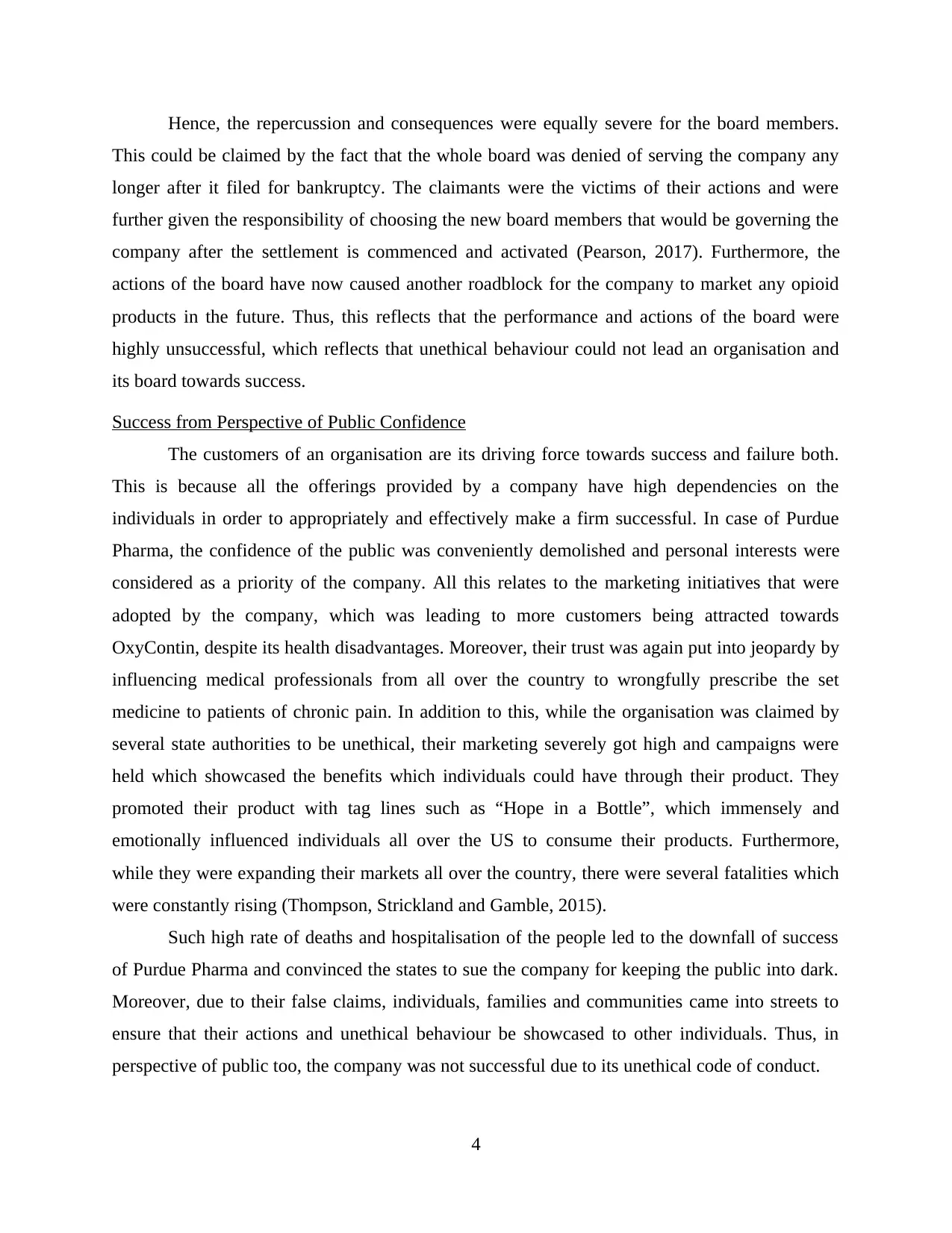
Hence, the repercussion and consequences were equally severe for the board members.
This could be claimed by the fact that the whole board was denied of serving the company any
longer after it filed for bankruptcy. The claimants were the victims of their actions and were
further given the responsibility of choosing the new board members that would be governing the
company after the settlement is commenced and activated (Pearson, 2017). Furthermore, the
actions of the board have now caused another roadblock for the company to market any opioid
products in the future. Thus, this reflects that the performance and actions of the board were
highly unsuccessful, which reflects that unethical behaviour could not lead an organisation and
its board towards success.
Success from Perspective of Public Confidence
The customers of an organisation are its driving force towards success and failure both.
This is because all the offerings provided by a company have high dependencies on the
individuals in order to appropriately and effectively make a firm successful. In case of Purdue
Pharma, the confidence of the public was conveniently demolished and personal interests were
considered as a priority of the company. All this relates to the marketing initiatives that were
adopted by the company, which was leading to more customers being attracted towards
OxyContin, despite its health disadvantages. Moreover, their trust was again put into jeopardy by
influencing medical professionals from all over the country to wrongfully prescribe the set
medicine to patients of chronic pain. In addition to this, while the organisation was claimed by
several state authorities to be unethical, their marketing severely got high and campaigns were
held which showcased the benefits which individuals could have through their product. They
promoted their product with tag lines such as “Hope in a Bottle”, which immensely and
emotionally influenced individuals all over the US to consume their products. Furthermore,
while they were expanding their markets all over the country, there were several fatalities which
were constantly rising (Thompson, Strickland and Gamble, 2015).
Such high rate of deaths and hospitalisation of the people led to the downfall of success
of Purdue Pharma and convinced the states to sue the company for keeping the public into dark.
Moreover, due to their false claims, individuals, families and communities came into streets to
ensure that their actions and unethical behaviour be showcased to other individuals. Thus, in
perspective of public too, the company was not successful due to its unethical code of conduct.
4
This could be claimed by the fact that the whole board was denied of serving the company any
longer after it filed for bankruptcy. The claimants were the victims of their actions and were
further given the responsibility of choosing the new board members that would be governing the
company after the settlement is commenced and activated (Pearson, 2017). Furthermore, the
actions of the board have now caused another roadblock for the company to market any opioid
products in the future. Thus, this reflects that the performance and actions of the board were
highly unsuccessful, which reflects that unethical behaviour could not lead an organisation and
its board towards success.
Success from Perspective of Public Confidence
The customers of an organisation are its driving force towards success and failure both.
This is because all the offerings provided by a company have high dependencies on the
individuals in order to appropriately and effectively make a firm successful. In case of Purdue
Pharma, the confidence of the public was conveniently demolished and personal interests were
considered as a priority of the company. All this relates to the marketing initiatives that were
adopted by the company, which was leading to more customers being attracted towards
OxyContin, despite its health disadvantages. Moreover, their trust was again put into jeopardy by
influencing medical professionals from all over the country to wrongfully prescribe the set
medicine to patients of chronic pain. In addition to this, while the organisation was claimed by
several state authorities to be unethical, their marketing severely got high and campaigns were
held which showcased the benefits which individuals could have through their product. They
promoted their product with tag lines such as “Hope in a Bottle”, which immensely and
emotionally influenced individuals all over the US to consume their products. Furthermore,
while they were expanding their markets all over the country, there were several fatalities which
were constantly rising (Thompson, Strickland and Gamble, 2015).
Such high rate of deaths and hospitalisation of the people led to the downfall of success
of Purdue Pharma and convinced the states to sue the company for keeping the public into dark.
Moreover, due to their false claims, individuals, families and communities came into streets to
ensure that their actions and unethical behaviour be showcased to other individuals. Thus, in
perspective of public too, the company was not successful due to its unethical code of conduct.
4
Paraphrase This Document
Need a fresh take? Get an instant paraphrase of this document with our AI Paraphraser
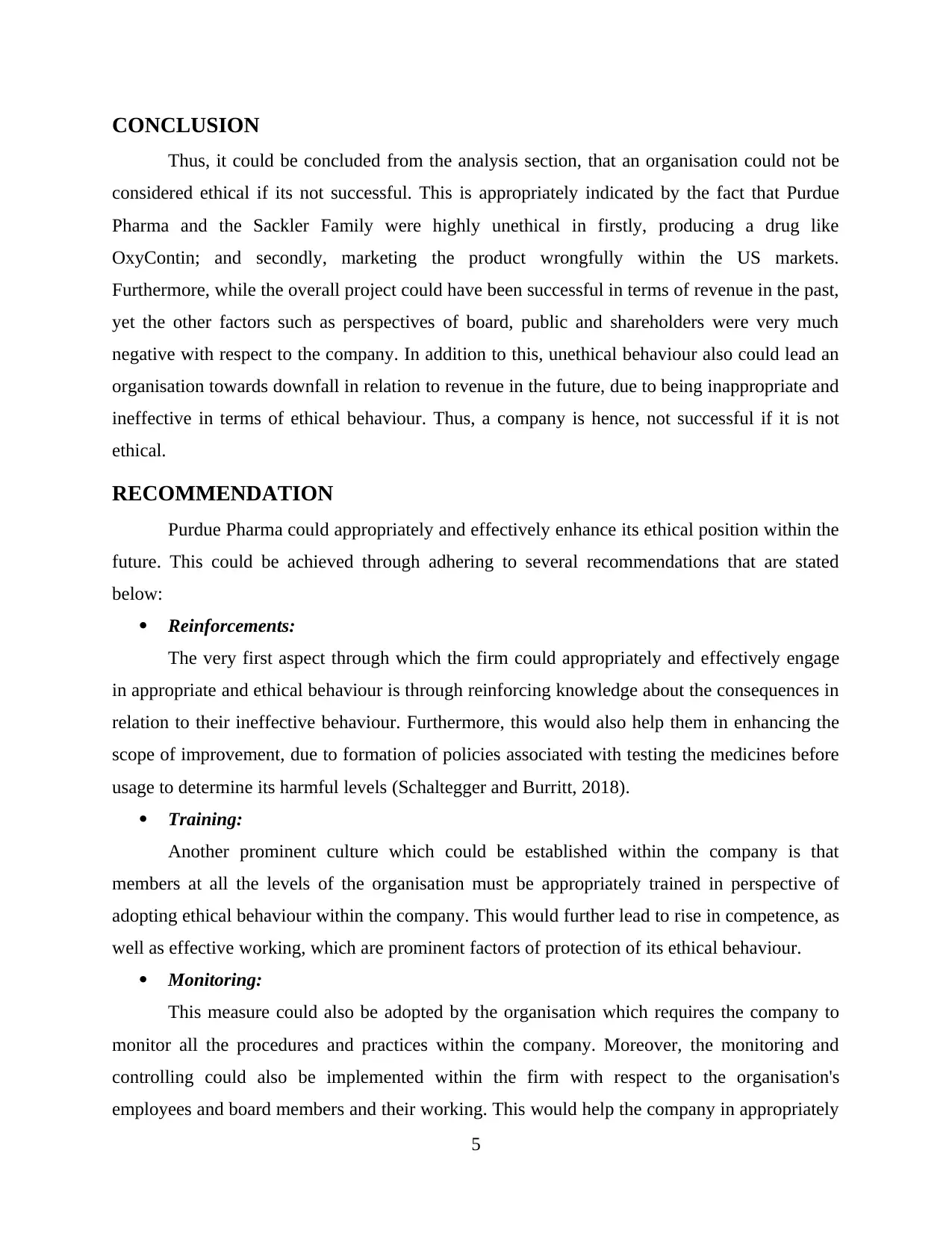
CONCLUSION
Thus, it could be concluded from the analysis section, that an organisation could not be
considered ethical if its not successful. This is appropriately indicated by the fact that Purdue
Pharma and the Sackler Family were highly unethical in firstly, producing a drug like
OxyContin; and secondly, marketing the product wrongfully within the US markets.
Furthermore, while the overall project could have been successful in terms of revenue in the past,
yet the other factors such as perspectives of board, public and shareholders were very much
negative with respect to the company. In addition to this, unethical behaviour also could lead an
organisation towards downfall in relation to revenue in the future, due to being inappropriate and
ineffective in terms of ethical behaviour. Thus, a company is hence, not successful if it is not
ethical.
RECOMMENDATION
Purdue Pharma could appropriately and effectively enhance its ethical position within the
future. This could be achieved through adhering to several recommendations that are stated
below:
Reinforcements:
The very first aspect through which the firm could appropriately and effectively engage
in appropriate and ethical behaviour is through reinforcing knowledge about the consequences in
relation to their ineffective behaviour. Furthermore, this would also help them in enhancing the
scope of improvement, due to formation of policies associated with testing the medicines before
usage to determine its harmful levels (Schaltegger and Burritt, 2018).
Training:
Another prominent culture which could be established within the company is that
members at all the levels of the organisation must be appropriately trained in perspective of
adopting ethical behaviour within the company. This would further lead to rise in competence, as
well as effective working, which are prominent factors of protection of its ethical behaviour.
Monitoring:
This measure could also be adopted by the organisation which requires the company to
monitor all the procedures and practices within the company. Moreover, the monitoring and
controlling could also be implemented within the firm with respect to the organisation's
employees and board members and their working. This would help the company in appropriately
5
Thus, it could be concluded from the analysis section, that an organisation could not be
considered ethical if its not successful. This is appropriately indicated by the fact that Purdue
Pharma and the Sackler Family were highly unethical in firstly, producing a drug like
OxyContin; and secondly, marketing the product wrongfully within the US markets.
Furthermore, while the overall project could have been successful in terms of revenue in the past,
yet the other factors such as perspectives of board, public and shareholders were very much
negative with respect to the company. In addition to this, unethical behaviour also could lead an
organisation towards downfall in relation to revenue in the future, due to being inappropriate and
ineffective in terms of ethical behaviour. Thus, a company is hence, not successful if it is not
ethical.
RECOMMENDATION
Purdue Pharma could appropriately and effectively enhance its ethical position within the
future. This could be achieved through adhering to several recommendations that are stated
below:
Reinforcements:
The very first aspect through which the firm could appropriately and effectively engage
in appropriate and ethical behaviour is through reinforcing knowledge about the consequences in
relation to their ineffective behaviour. Furthermore, this would also help them in enhancing the
scope of improvement, due to formation of policies associated with testing the medicines before
usage to determine its harmful levels (Schaltegger and Burritt, 2018).
Training:
Another prominent culture which could be established within the company is that
members at all the levels of the organisation must be appropriately trained in perspective of
adopting ethical behaviour within the company. This would further lead to rise in competence, as
well as effective working, which are prominent factors of protection of its ethical behaviour.
Monitoring:
This measure could also be adopted by the organisation which requires the company to
monitor all the procedures and practices within the company. Moreover, the monitoring and
controlling could also be implemented within the firm with respect to the organisation's
employees and board members and their working. This would help the company in appropriately
5
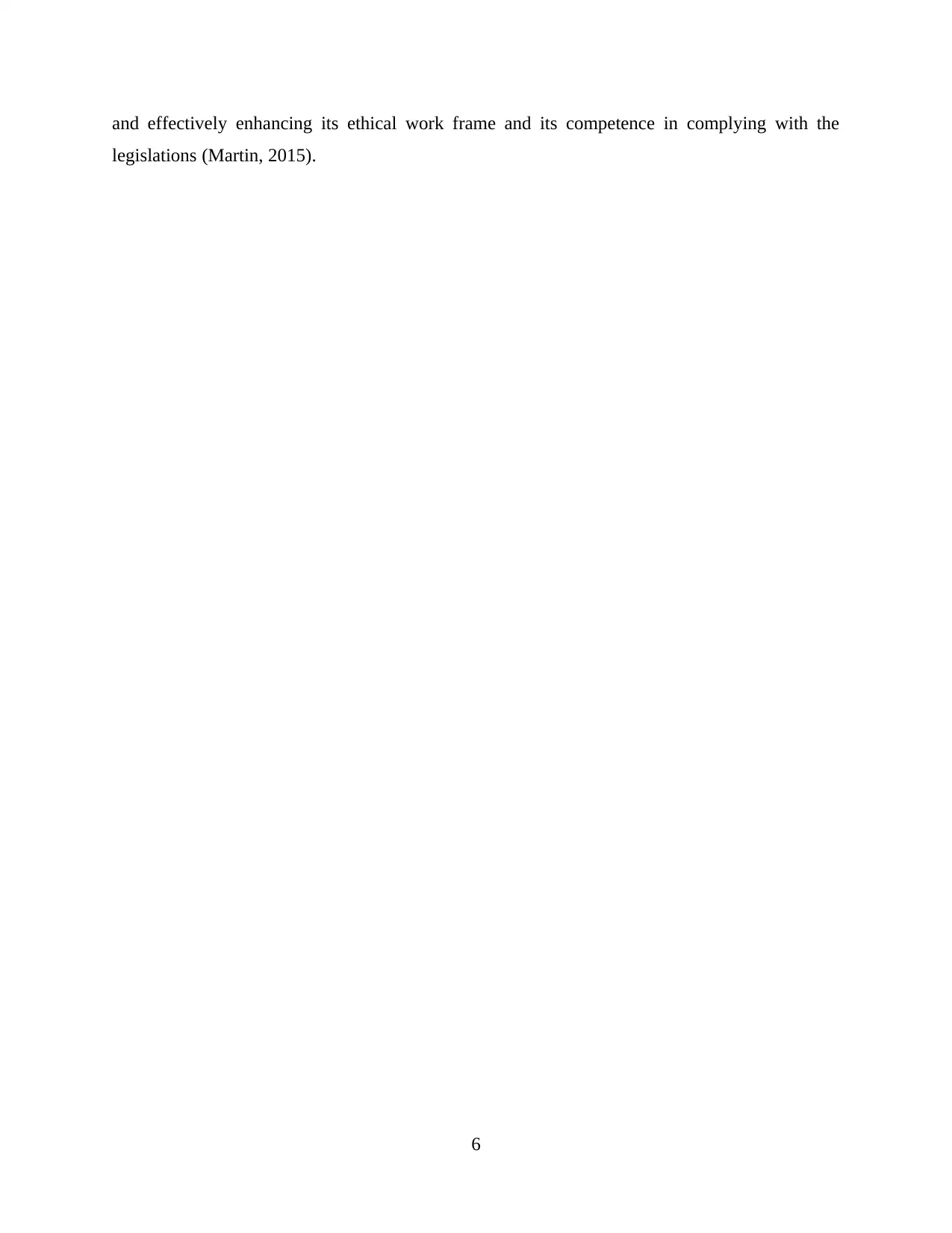
and effectively enhancing its ethical work frame and its competence in complying with the
legislations (Martin, 2015).
6
legislations (Martin, 2015).
6
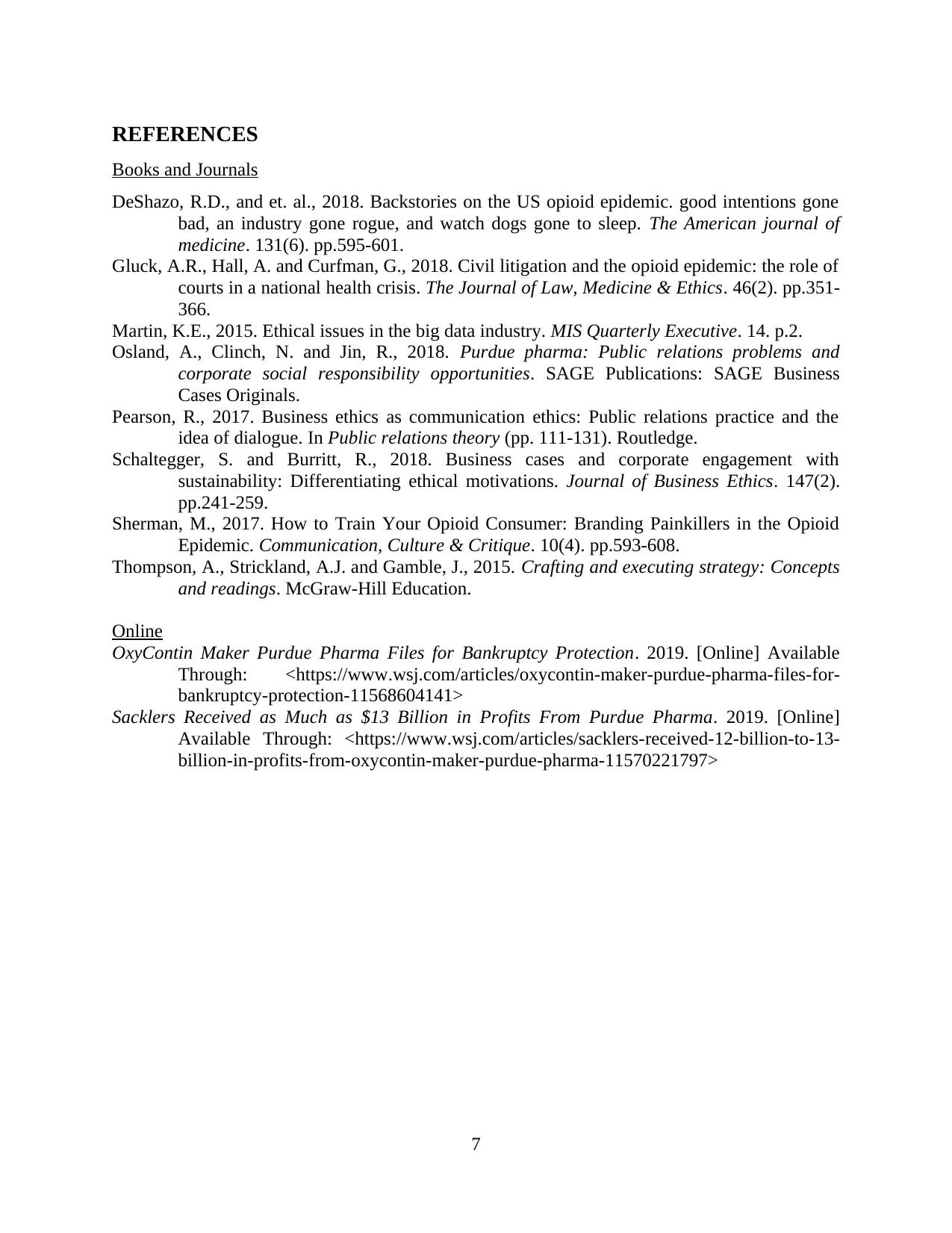
REFERENCES
Books and Journals
DeShazo, R.D., and et. al., 2018. Backstories on the US opioid epidemic. good intentions gone
bad, an industry gone rogue, and watch dogs gone to sleep. The American journal of
medicine. 131(6). pp.595-601.
Gluck, A.R., Hall, A. and Curfman, G., 2018. Civil litigation and the opioid epidemic: the role of
courts in a national health crisis. The Journal of Law, Medicine & Ethics. 46(2). pp.351-
366.
Martin, K.E., 2015. Ethical issues in the big data industry. MIS Quarterly Executive. 14. p.2.
Osland, A., Clinch, N. and Jin, R., 2018. Purdue pharma: Public relations problems and
corporate social responsibility opportunities. SAGE Publications: SAGE Business
Cases Originals.
Pearson, R., 2017. Business ethics as communication ethics: Public relations practice and the
idea of dialogue. In Public relations theory (pp. 111-131). Routledge.
Schaltegger, S. and Burritt, R., 2018. Business cases and corporate engagement with
sustainability: Differentiating ethical motivations. Journal of Business Ethics. 147(2).
pp.241-259.
Sherman, M., 2017. How to Train Your Opioid Consumer: Branding Painkillers in the Opioid
Epidemic. Communication, Culture & Critique. 10(4). pp.593-608.
Thompson, A., Strickland, A.J. and Gamble, J., 2015. Crafting and executing strategy: Concepts
and readings. McGraw-Hill Education.
Online
OxyContin Maker Purdue Pharma Files for Bankruptcy Protection. 2019. [Online] Available
Through: <https://www.wsj.com/articles/oxycontin-maker-purdue-pharma-files-for-
bankruptcy-protection-11568604141>
Sacklers Received as Much as $13 Billion in Profits From Purdue Pharma. 2019. [Online]
Available Through: <https://www.wsj.com/articles/sacklers-received-12-billion-to-13-
billion-in-profits-from-oxycontin-maker-purdue-pharma-11570221797>
7
Books and Journals
DeShazo, R.D., and et. al., 2018. Backstories on the US opioid epidemic. good intentions gone
bad, an industry gone rogue, and watch dogs gone to sleep. The American journal of
medicine. 131(6). pp.595-601.
Gluck, A.R., Hall, A. and Curfman, G., 2018. Civil litigation and the opioid epidemic: the role of
courts in a national health crisis. The Journal of Law, Medicine & Ethics. 46(2). pp.351-
366.
Martin, K.E., 2015. Ethical issues in the big data industry. MIS Quarterly Executive. 14. p.2.
Osland, A., Clinch, N. and Jin, R., 2018. Purdue pharma: Public relations problems and
corporate social responsibility opportunities. SAGE Publications: SAGE Business
Cases Originals.
Pearson, R., 2017. Business ethics as communication ethics: Public relations practice and the
idea of dialogue. In Public relations theory (pp. 111-131). Routledge.
Schaltegger, S. and Burritt, R., 2018. Business cases and corporate engagement with
sustainability: Differentiating ethical motivations. Journal of Business Ethics. 147(2).
pp.241-259.
Sherman, M., 2017. How to Train Your Opioid Consumer: Branding Painkillers in the Opioid
Epidemic. Communication, Culture & Critique. 10(4). pp.593-608.
Thompson, A., Strickland, A.J. and Gamble, J., 2015. Crafting and executing strategy: Concepts
and readings. McGraw-Hill Education.
Online
OxyContin Maker Purdue Pharma Files for Bankruptcy Protection. 2019. [Online] Available
Through: <https://www.wsj.com/articles/oxycontin-maker-purdue-pharma-files-for-
bankruptcy-protection-11568604141>
Sacklers Received as Much as $13 Billion in Profits From Purdue Pharma. 2019. [Online]
Available Through: <https://www.wsj.com/articles/sacklers-received-12-billion-to-13-
billion-in-profits-from-oxycontin-maker-purdue-pharma-11570221797>
7
1 out of 10
Related Documents
Your All-in-One AI-Powered Toolkit for Academic Success.
+13062052269
info@desklib.com
Available 24*7 on WhatsApp / Email
![[object Object]](/_next/static/media/star-bottom.7253800d.svg)
Unlock your academic potential
© 2024 | Zucol Services PVT LTD | All rights reserved.





